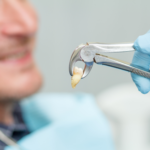As parents, we eagerly await the arrival of our little one’s first set of teeth, commonly known as milk teeth or baby teeth. These tiny pearly whites play a crucial role not only in the aesthetics of your child’s smile but also in their overall dental health. In this blog post, we’ll explore the significance of milk teeth, their developmental stages, and why caring for them is fundamental to your child’s oral well-being.
Understanding Milk Teeth:
- Early Dental Development: Milk teeth typically begin to emerge around six months of age, although this can vary. The first teeth to appear are usually the lower central incisors, followed by the upper central incisors. By the age of three, most children have a full set of 20 milk teeth.
- Functionality: While these teeth are temporary, they serve essential functions. Milk teeth enable your child to bite and chew food, aiding in proper digestion. They also play a crucial role in speech development.
- Facilitating Jaw Development: Milk teeth contribute to the development of the jawbone and create the necessary space for the permanent teeth that will follow. Maintaining the health of milk teeth sets the stage for a healthy adult dentition.
Importance of Caring for Milk Teeth:
- Preventing Tooth Decay: Despite being temporary, milk teeth are susceptible to decay. Establishing good oral hygiene habits early on, such as regular brushing and flossing, helps prevent cavities and sets the foundation for a lifetime of healthy dental practices.
- Speech Development: Properly aligned and healthy milk teeth play a significant role in speech development. They help children pronounce words clearly and form sounds essential for effective communication.
- Facilitating Nutrition: Healthy milk teeth contribute to proper nutrition by allowing children to bite and chew a variety of foods. This, in turn, supports their overall growth and development.
- Boosting Confidence: A bright and healthy smile can boost a child’s confidence. Caring for milk teeth instills good dental habits early on and sets the stage for a positive attitude towards oral health.
Tips for Caring for Milk Teeth:
- Early Dental Visits: Schedule your child’s first dental visit by their first birthday or when their first tooth erupts. Early dental check-ups help monitor dental development and address any concerns.
- Balanced Diet: Provide a balanced diet rich in vitamins and minerals essential for dental health. Limit sugary snacks and beverages, as excessive sugar intake contributes to tooth decay.
- Regular Brushing: Start brushing your child’s teeth as soon as they emerge using a soft-bristled toothbrush and a small amount of fluoride toothpaste. Encourage them to develop the habit of brushing at least twice a day.
- Supervise Brushing: Supervise your child’s brushing until they have the dexterity to do it effectively on their own, usually around the age of six.
Conclusion:
Milk teeth are not just placeholders for permanent teeth; they play a vital role in your child’s overall well-being. By understanding their importance and instilling good oral hygiene habits early on, you pave the way for a lifetime of healthy smiles. Remember, caring for milk teeth is an investment in your child’s future dental health, ensuring they grow up with strong, confident smiles.








